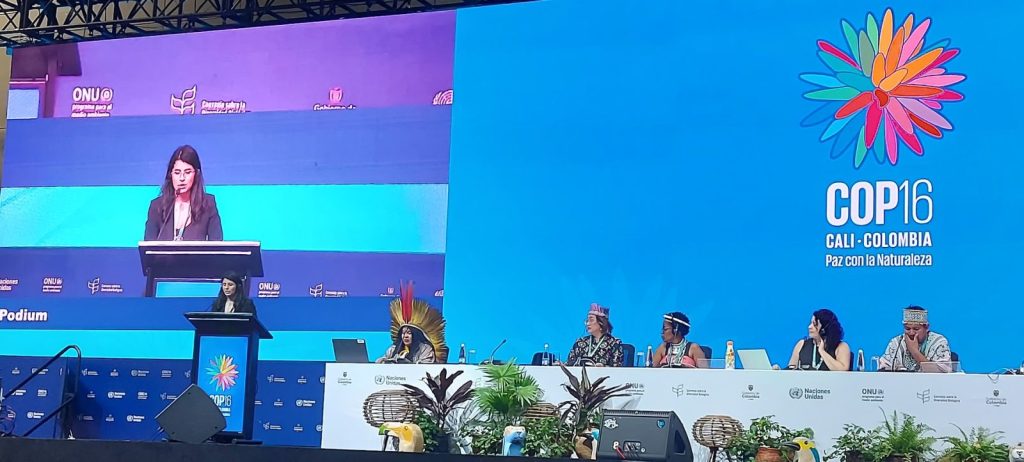CALI, Colombia, November 8, 2024: The 16th meeting of the Conference of the Parties to the Convention on Biological Diversity (CBD COP16) closed earlier this week after 10 days of intense negotiations to advance the targets of the Kunming-Montreal Global Biodiversity Framework (KMGBF).
Despite a historic decision on the establishment of a work programme under Article 8(j) and a permanent subsidiary body to ensure the full participation of Indigenous Peoples and People of African descent, parties failed to reach consensus on important agreements needed to fund and monitor the implementation of the KM-GBF.
Under the theme, Peace with Nature, COP16 was the first Biodiversity COP since the adoption of the KMGBF at COP15 in December 2022 in Montreal, Canada. Fostering peace and harmony with nature was Colombia’s message to states across the world in recognition of the unequal, destructive and extractive activities, especially those associated with fossil fuels, that overexploit nature, violate human rights and accelerate mutually reinforcing planetary crises like biodiversity loss, climate change and pollution.
Natural Justice observed negotiations related to the important role of Indigenous Peoples and local communities in biodiversity protection and safeguarding land, the environment and climate. NJ, in alliance with civil society organizations, advocated for the inclusion of language on equity, justice and a human rights-based approach to the implementation, monitoring and financing of the KMGBF, with a specific focus on the urgent need for state parties to respect, protect and fulfill the rights of environmental and land defenders who are increasingly facing reprisals for their important activism in safeguarding land, oceans and environmental democracy.
NJ experts released the following statements on the outcomes of COP16:
“The COP16’s wins, although welcome, are sadly undercut by its failure to take final decisions on the monitoring framework and resources mobilization, which does not bode well for the upcoming COP29 Climate Talks in Azerbaijan, with finance being the key fight in Baku. The success of both environmental conventions and ultimately the fulfilment of human rights related to climate and biodiversity crises, is contingent on finance. The lack of political will by developed states, based on the fundamental principles of historical responsibility and equity, creates fertile ground for the promotion and advancement of false solutions like biodiversity credits, carbon credits, and offsetting which pose serious risks for human rights and achieving both climate and biodiversity justice. Thankfully we can praise the UNCBD for upholding the rights of Indigenous Peoples and the moratorium on geoengineering, sending a critical message, ahead of COP29 where dangerous distractions like geoengineering are being punted as ostensible ‘solutions’ to address climate change.” – Katherine Robinson, Natural Justice, Head of Campaigns.
“The establishment of a permanent subsidiary body to represent Indigenous Peoples and local communities’ interests in negotiations under the UN Convention of Biodiversity is a significant win for land and environmental defenders. COP 16 brings some semblance of renewed hope going into COP 29. Despite having the International Indigenous Peoples Forum on Climate Change (IIPFCC) in the UNFCCC space, the knowledge and contributions of defenders and Indigenous Peoples are largely ignored. We see this as an opportunity to reiterate the importance of recognizing the leadership of Indigenous Peoples in safeguarding the planet.” – Tawonga Chihana, Natural Justice, Coordinator- African Environmental Defenders Initiative.
“We are concerned to see a very limited integration of human rights-based approaches (HRBA) in some outcomes of the COP16, particularly in resource mobilization and in the marine and coastal biodiversity items. It is crucial to ensure that the national ambitions and strategies (NBSAPs) meet international human rights commitments. The climate and nature crises need a human rights-centered approach. We hope that all unresolved issues will soon be addressed at the next intersessional meeting in 2025.” – Jazzy Rasolojaona, Programme Manager, Natural Justice

